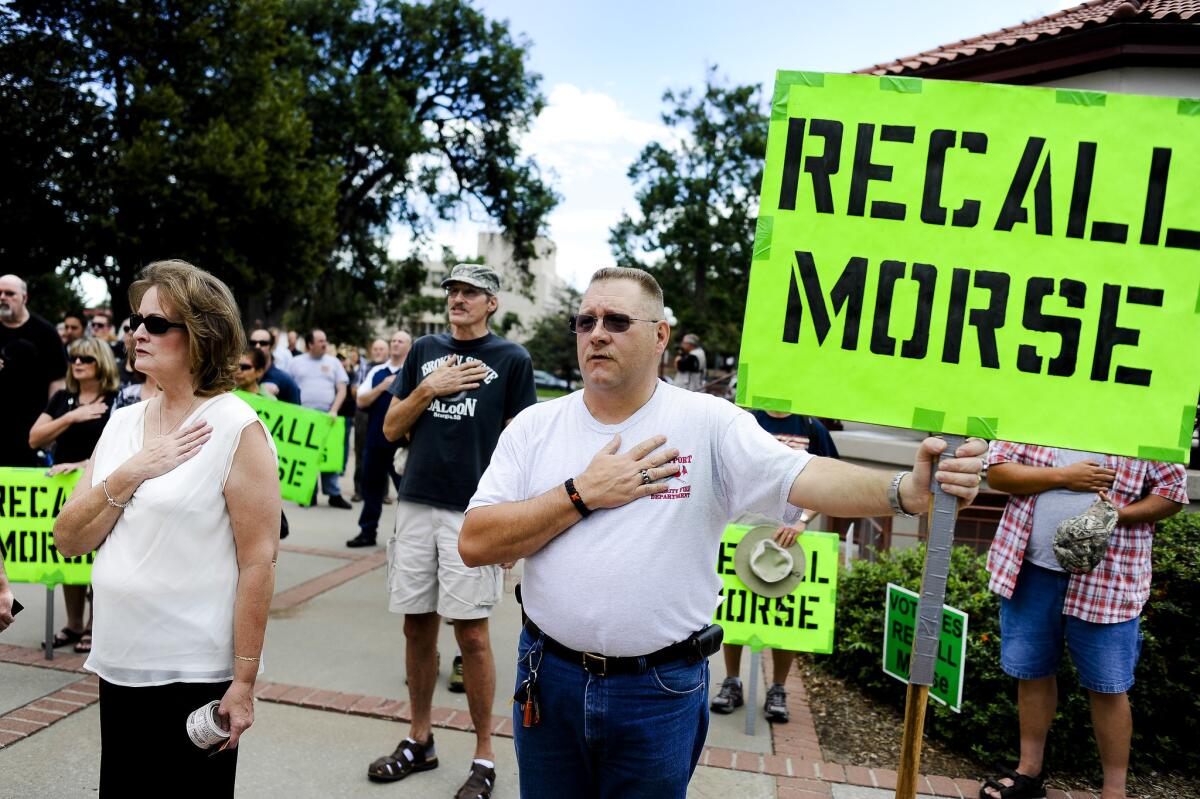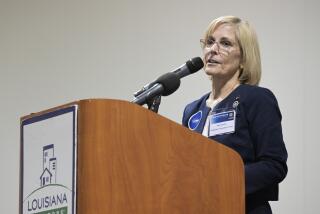In a turnabout, Colorado Democrats win back seats lost in gun recall

Few states have experienced the political volatility that Colorado has over the last two decades.
Control of the Legislature flipped back and forth. The state see-sawed in presidential contests.
The last two years, though, have been particularly eventful.
In 2013, after Democrats seized control of the statehouse under Democratic Gov. John Hickenlooper, lawmakers went on a spree, passing a liberal wish list that thrilled left-leaning constituents but alienated plenty of others, especially rural conservatives upset by a brace of gun-control measures adopted after the July 2012 Aurora theater massacre.
The result, just a few months later, was a nationally publicized recall that ended in the ouster of two Democratic lawmakers, one of them president of the state Senate.
On Tuesday, however, in a little-noticed footnote to Colorado’s closely watched gubernatorial and U.S. Senate races, the Democrats won back both of those seats, and it wasn’t at all close in either Pueblo or Colorado Springs.
At the time, the recall was trumpeted far and wide as a victory for pro-gun activists; a third state senator in the Denver suburbs quit soon after rather than face the prospect of being tossed from office before this year’s elections.
Now it’s gun-control activists who are crowing.
Mark Glaze, former executive director of the group Everytown for Gun Safety, said the results showed that when a significant portion of the electorate turns out, rather than a small, agitated minority, support for something like universal background checks for gun buyers is a politically winning position. (That was part of the package Hickenlooper, who was reelected Tuesday, signed into law.)
“The message remains that the [National Rifle Association] can bully politicians or buy them for a few pieces of silver but they have no influence over the general public,” Glaze said.
“Interesting statement from a man who doles out money the way he does,” replied Laura Carno, a conservative strategist in Colorado Springs who helped lead the recall effort against then-State Senate President John Morse. The reference was to former New York City Mayor Michael Bloomberg, whose generous contributions and organization, Mayors Against Illegal Guns, became an issue in the recall.
Once in Denver, the state capital, the Republicans who replaced the two booted Democrats joined efforts to overturn the state’s background check requirement, as well as a new law limiting the size of gun magazines to 15 rounds or fewer.
Both attempts failed but not before the Republican who replaced Morse, Bernie Herpin, rather indelicately suggested it was “maybe a good thing” that accused killer James Holmes showed up at the Aurora theater with a 100-round magazine “because it jammed.”
“If he had four, five, six 15-round magazines, there’s no telling how much damage he could have done until a good guy with a gun showed up,” Herpin said.
The remark caused great upset, not least for relatives of the Aurora victims, but didn’t necessarily damage Herpin’s reelection chances. Strategists on both sides say gun issues played little role in this fall’s campaign, in either Pueblo or Colorado Springs.
Allies of Morse did, however, take particular pleasure in Herpin’s defeat by Democrat Michael Merrifield, who once worked for Bloomberg’s anti-gun group.
As for the former lawmaker, his feeling is less a sense of vindication than an attitude of I-told-you so.
He noted that both Senate districts are heavily Democratic and even the relatively meager turnout for Tuesday’s midterm election far exceeded the 20% of voters who cast ballots in the September 2013 recall vote.
“It’s like, yeah, of course,” Morse said in a telephone interview from Denver, where he opened a certified public accounting practice. “We were always going to take back that seat and we did.”
Morse had been scheduled to leave office under term limits in January 2015.
“I had an eight-year contract, in two four-year increments. The voters let me out after seven years,” he said. He professed no regrets.
“I’m glad I did what I did,” Morse said of his support for the gun legislation.
As for Herpin, he called during a break in a Republican caucus luncheon, where lawmakers were awaiting a count of votes in suburban Adams County to learn which party will control the Senate starting next year.
He expressed no regrets either. “It was an honor to serve,” Herpin said of his relatively brief Senate term, adding it was too soon to say whether he will run again in 2016.
Don’t wait for the next special election to follow @markzbarabak for more on national & Western politics
More to Read
Get the L.A. Times Politics newsletter
Deeply reported insights into legislation, politics and policy from Sacramento, Washington and beyond. In your inbox three times per week.
You may occasionally receive promotional content from the Los Angeles Times.











